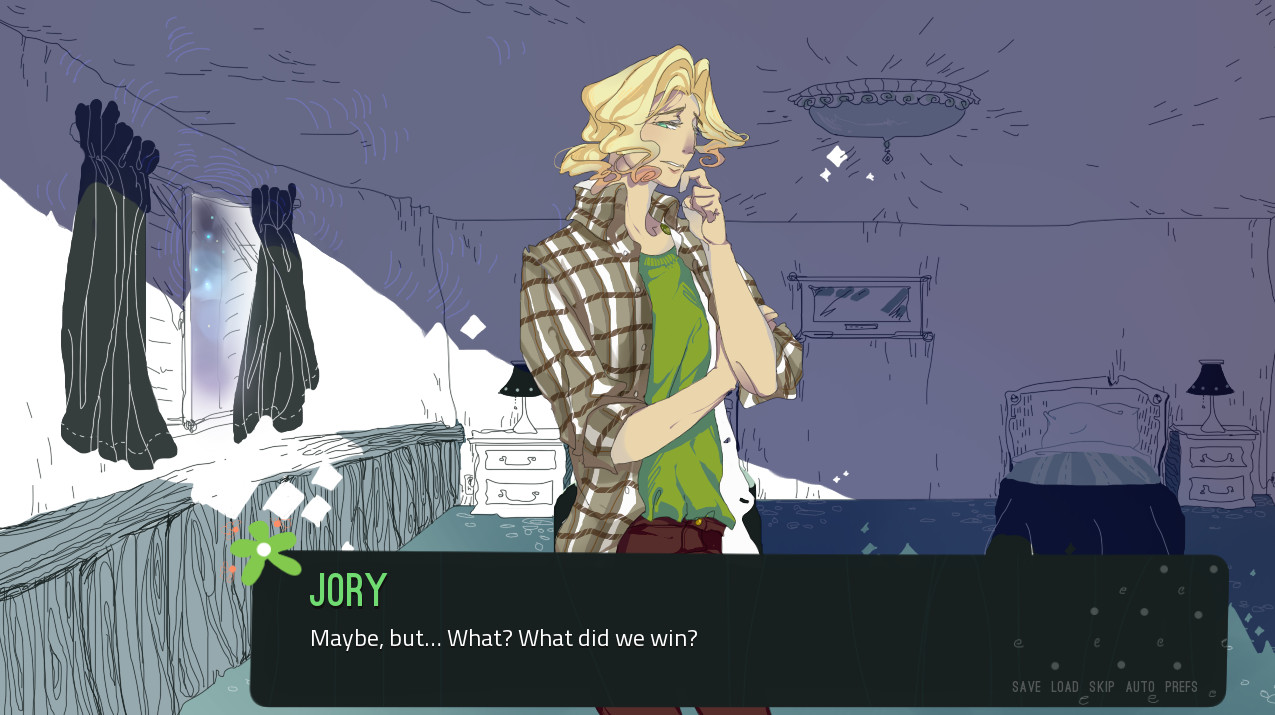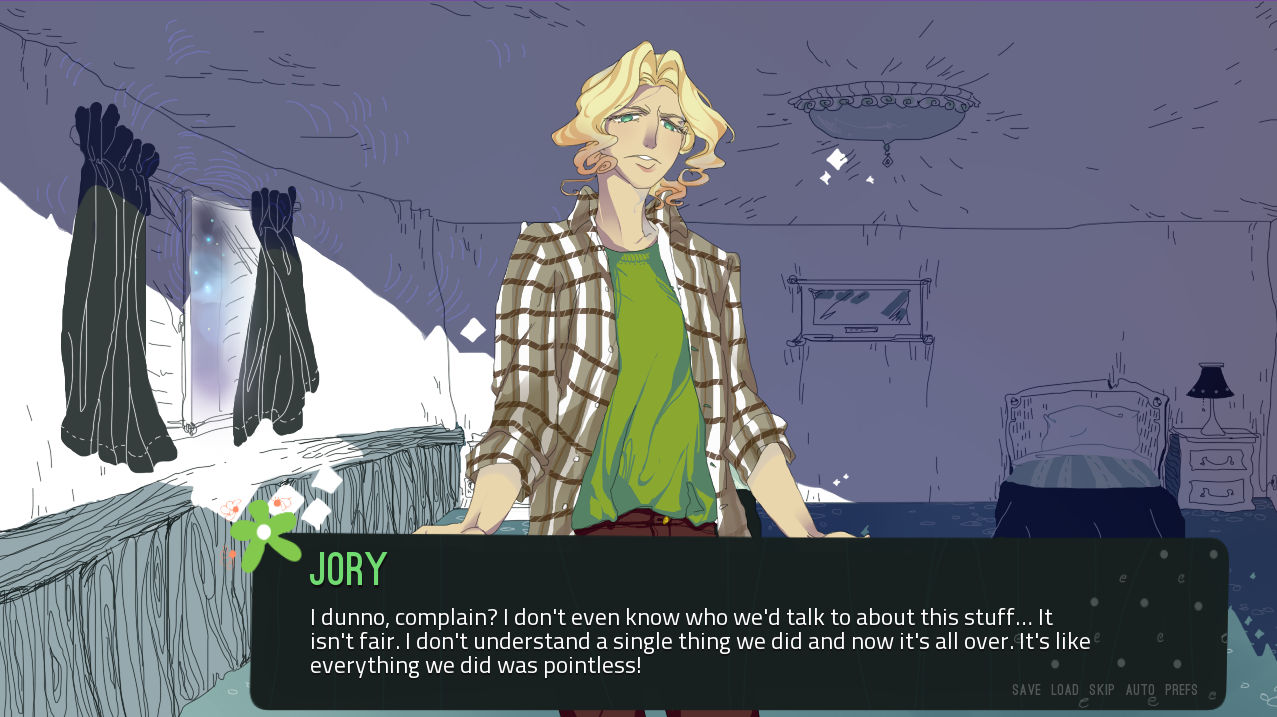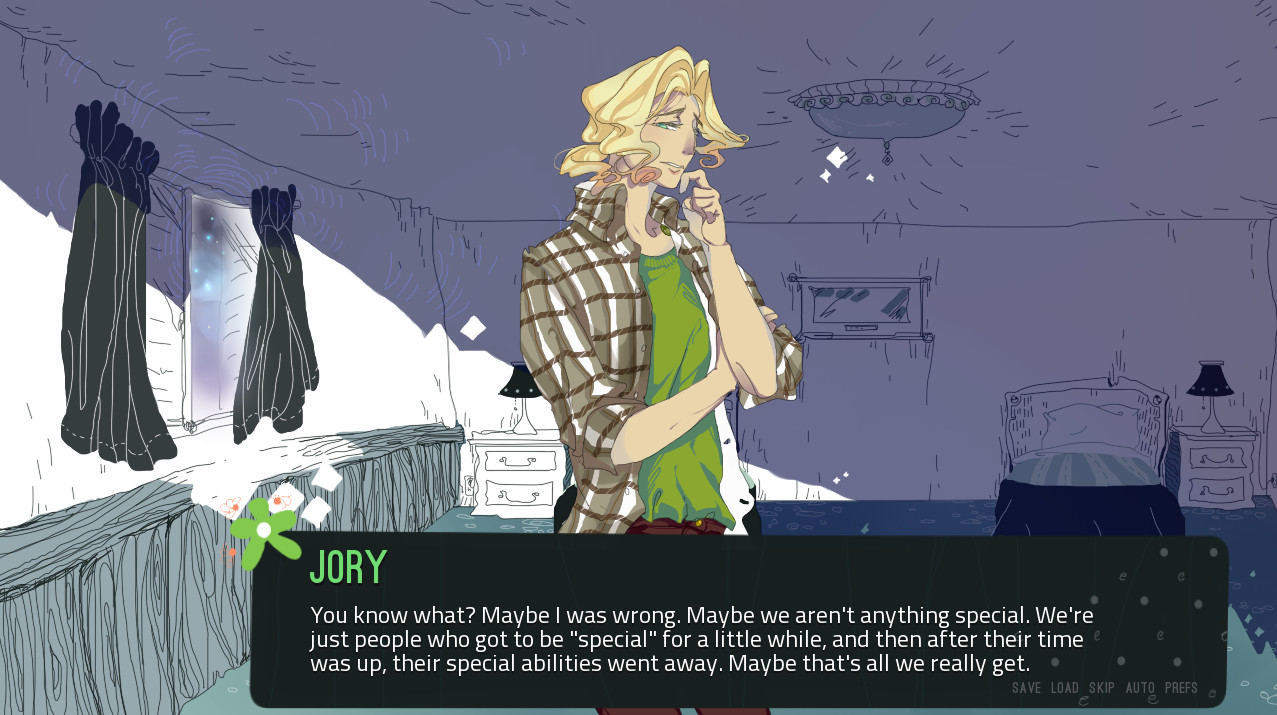Subversions Between Nothings
green eyed monster is, unsubtly, a story about jealousy. lana is a disaffected college student who is at a glance relatable. cold, confident, “won’t take your shit” aura, i know her defense mechanisms well. it’s been a long series of events: today she finds herself in a car with her ex-girlfriend, to spend a weekend together somewhere in nowhere, which understandably is the last thing she wants to do. but it wasn’t her choice to make. in high school, lana and her ex, jory, were chosen to be magical girls, and as such they are earth’s only defense against interdimensional monster attacks. though, there hasn’t been a monster attack in four years. the two’ve moved on, drifted apart, living in different cities, doing different things. the novel-participant slowly learns about their history together and decides how the viewer-character lana should act around her ex.
green eyed monster holds a straightforward tension of bitterness and grudge-having. a kind made cold by distance and separation, unknowable to the audience by exemption. i’m used to taking a visual novel’s narrator at truth and face value. lana is also funny and charismatic, the edge in her voice too relatable to not be justified. she’s gone through some shit and isn’t here for any more.
well, it turns out that lana might be, maybe, is actually… kind of a jerk. even if Jory is often inconsiderate and aloof, lana unambiguously screwed up big time in their past relationship and gets to forge forward on a brave path of fucking up all over again. i found it easy to trust and give her the benefit of the doubt as she occupies a point of view i’m used to putting up with. in my experience, visual novel protagonists are accidentally jerks. like a player will pick the bad choice and reap the consequences, but the game, the fantasy, is all about being able to go back with that knowledge to pick the right one, and probably eventually attain happiness and love.
while playing the game, i felt pretty convinced that lana was right in her assertions, reactions, and opinions. i mean, it’s like role-playing, and this play comes from near confidence. it’s likely that someone’s first bad end playthrough paints lana in a totally sympathetic light, because the characters will refuse to talk to each other. which is what happened on my first go. there’s kind of a metagame-like interplay of discovery, where i’m trying to figure out what happened between the two because, well of course i have to know, but also to understand if the choices I’m making are even appropriate to make. which lends any choice to feeling like a blank swirl of bad knowledge and good intentions that accompanies any worthy mistake.
i didn’t like the point system determining whether or not a bad end occurs. affection points are a relatively common visual novel and dating sim mechanic. they are what they sound like: accumulated event flags that measure how much characters “like” each other, weighing different decisions in the game with more or less points accordingly. in green eyed monster, if jory doesn’t have enough affection points toward lana, she lets her die during their magical face off with an interdimensional monster.
it would’ve been more interesting if Jory saved Lana and the affectionless, frustrated Lana had to deal with owing her life to someone she hates, or something like that. instead, jory commits negligent manslaughter. it’s within her power to save lana, and because they’re having a falling out, she doesn’t. which is… basically murder. if the core of the story is deciding whether or not jory is a manipulator, this ending states that she is, erasing the doubt at the core of the story. yet the story doesn’t really have the background, stakes, or interactions that would “rationalize” serious harm, so these lose states feel like they’re included de facto, somewhat distracting and detracting from what what the game is trying to accomplish.
anyway, with adrenaline coursing, and the indescribable of saving each other’s lives, neither wants to be alone, and if the requirements are met for the two to make up, mistakes can be made. i really like how non-judgemental, psyche-slidey green eyed monster presents its conclusions. when jory starts making out with lana, lana feels good about it. it feels right. it’s something the viewer-player lets happen, rather than chooses. that is, the mouse moves by itself toward the choice, symbolically letting it happen, and the choice is time-limited, so it feels kind of like a gotcha. i was yelling at my pc when the choice was made “for me.” (and I could write a whole separate essay on the implications of a “manipulative” mechanic like that).
i reloaded my save, intervened in a parental way from my software perch, and now this lana realizes cheating is bad! this isn’t the right way to restart their relationship! my naivete was shook as I realized the obvious yeah this would be an awful start to a relationship that already ended on bad terms because of cheating. this emphasis reflects back mechanisms of trust and vulnerability in a way that feels explicit but non-judgemental. it feels honest, though maybe it will have less of an impact on people who aren’t as idiotic, trusting, and impressionable as me.
my appreciation of multiple endings is when they adequately feel like a possibility space; where ends are different results, not obviously bad stops on the way to the to a true end. in a possibility space the endings self-justify. that means they accomplish a strange relation of diametrically different events accompanied by similar atmospheres, like a forced relation enabled by their shared narrative and aesthetic framing. it’s common to infer choices and consequences in games come from a point of staged neutrality, but that’s rarely true. they aren’t science experiments. they’re narrative curation. it’s a statement like, these events now feel similar, they’re being made to feel similar, so what does that mean?
green eyed monster is a short story, so it relies on imaginative interpretations of what happened before, and what will happen after. it doesn’t make any definitive statements about what getting validation from another is supposed to look like, or what that happiness looks like, or how to go about it in a prescriptive way. it presents a messy situation and gave me enough space to think about it, and inevitably i contrast the situation with romance stories i’ve been exposed to, that instead feel pretty predetermined and are focused on “solving” the interpersonal through compromise and togetherness. (the visual novels i’m familiar with being made by and for men might be a common denominator there). for me, this visual novel was refreshing, and shows that the visual novel format can specifically elevate interpersonal complications in a way that, well, feels adequately complicated.
***
There was something heavy in some of the subtext and implied interiority in the game, which pushes the themes into a very “modern” container. Not to mince words, I’m confident that Green Eyed Monster was influenced by Puella Magi Madoka Magica, from how its own magical girl mythos was presented: its mystery, its terror, the up-close-and-personal fighting styles of the leads, and especially their grudging participation.
In a ballpark of ten years ago, “deconstruction” was a cultural juggernaut among English speaking fans of Japanese media. Though essentially inspired by deconstruction in the Derridean sense of differance and impossibility, the obnoxious nerd interpretation is largely divorced from the spirit of anti-structuralism because the understood genre is essentially a deterministic container. And yet this misinterpretation of “deconstruction” coalesced into the anime intelligentsia apparent. Neon Genesis Evangelion and Puella Magi Madoka Magica became memetic showrunners. The idea, as far as I have come to understand it, was to have a shorthand that referred to anime productions suitably aware, reflexive, and ultimately critical of their respective genre history—though popularly, and ironically, only described titles that were appropriately melodramatic or tragic.
Now I think there’s been kind of a comeuppance, as attraction to, and use of deconstruction, has been overdone to the point of nonsense. Stuff like Mahou Shoujo Site demonstrates that this popular understanding of violent excess as a de facto critique of cultural and media history is a disgusting dead end. However, I don’t think popular, so-called deconstructions, have ever met the goals they’ve been assigned. In the spirit of deconstruction, consider, how can extremely popular, zeitgeist defining media moments, define themselves in their capability to critique themselves? These interpretations function with pre-supposed intention that deconstructive works were defining themselves against their own history, which I believe runs counter to their marketability and success. Madoka is something situated in its history already; it boasts being cruel and melodramatic, neither of which are concepts foreign to either the magical shoujo or superhero genres.
In short, deconstruction-as-marketing is a paradox of terms. Evangelion, etc, though responding to and reflexive of their histories, were created in homage to that history. Every popular deconstruction contains the glorification of methodical semiotics that signify its genre (giant robots, magical transformations) and these symbols function powerfully and as expected. What then is being deconstructed? Deconstruction in nerd spaces is an unspecific misnomer, it refers to something in the tradition of satire, or tragedy, or metafiction, or post-postmodernism, or whatever.
Now, I think Green Eyed Monster comes closer to the intention of deconstruction. I do not intend to define either Green Eyed Monster’s queerness, or its portrayal of a conflicted relationship, as concepts that exist purely in negation to mainstream cultures reflected in pop fiction. Rather, Jory has an extended monologue that calls into question magical girl tropes, and explicitly puts their lives as magical girls in negation to the point of magical girls. More specifically, I believe core, historical themes, from this tradition of storytelling, are being taken to a place of genuine deconstruction, purposefully nullifying their expected impact, in a way that is not destroying or inverting the themes like Madoka and the works it inspired would.



there was no secret extraterrestrial war. there was no twist that some outside power relies on the "tenacity" of young girls. the characters never got real communication with any outside power. there was no closure. the protagonists assumed they were assigned urgent work because they weren’t able to imagine otherwise. they never found evidence of urgency, or any allusions to importance. it was a part of their life, and in jory’s moment of vulnerability, it was a nothing. a void. a compulsory deathlike pantomime that felt good until the novelty bled dry.
and it wasn’t nothing. being a magical girl was important to both of them. it was their world. it’s how they fell in love. even if none of it was explained; even if it never made any sense. confronted with partial understanding, they did their best. they did what they thought was right. if there is any potential of reflecting “reality” through a deconstructive story, i think it looks like this. deconstruction is supposed to be a process that reminds us understanding itself is hypocritical, tense, and incomplete. Acting anyway in the face of the unknowable is essentially being human.
published 5/6/2019


